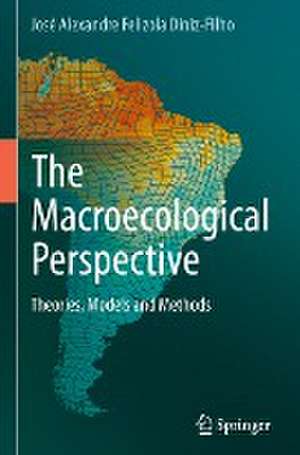The Macroecological Perspective: Theories, Models and Methods
Autor José Alexandre Felizola Diniz-Filhoen Limba Engleză Hardback – 27 noi 2023
This comprehensive volume discusses the patterns and processes analyzed in macroecology with a distinct look at the theoretical and methodological issues underlying the discipline as well as deeper epistemological matters. The book serves as a synthesis of macroecological literature that has been published since Brown and Maurer proposed and defined the term “macroecology” in 1989. Author José Alexandre Felizola Diniz-Filho draws from the different disciplines and branches (ecology, evolutionary biology, physiology, behavioral sciences, climatology, and paleontology) that make up macroecology to present a full, holistic picture of where the discipline stands.
Through ten chapters, Diniz-Filho moves from a discussion of what macroecology actually is to macroecological modeling to the more applied side of the discipline, covering topics such as richness and diversity patterns and patterns in body size. The book concludes with a synthesis of how macroecological research is done in a theoretical and operational sense as well as unifying explanations for each of the macroecological patterns discussed, moving on to evaluate which theories and models are still useful and which ones can be abandoned. The book is intended for academics, young researchers and students interested in macroecology and conservation biogeography. In addition, because of the integrative nature of macroecology and the theoretical and methodological background in the book, it can be of interest to researchers working in related fields including but not limited to ecology and evolutionary biology.
Through ten chapters, Diniz-Filho moves from a discussion of what macroecology actually is to macroecological modeling to the more applied side of the discipline, covering topics such as richness and diversity patterns and patterns in body size. The book concludes with a synthesis of how macroecological research is done in a theoretical and operational sense as well as unifying explanations for each of the macroecological patterns discussed, moving on to evaluate which theories and models are still useful and which ones can be abandoned. The book is intended for academics, young researchers and students interested in macroecology and conservation biogeography. In addition, because of the integrative nature of macroecology and the theoretical and methodological background in the book, it can be of interest to researchers working in related fields including but not limited to ecology and evolutionary biology.
Preț: 1017.62 lei
Preț vechi: 1241.00 lei
-18% Nou
Puncte Express: 1526
Preț estimativ în valută:
194.72€ • 212.18$ • 164.08£
194.72€ • 212.18$ • 164.08£
Carte disponibilă
Livrare economică 02-16 aprilie
Preluare comenzi: 021 569.72.76
Specificații
ISBN-13: 9783031446108
ISBN-10: 3031446100
Pagini: 449
Ilustrații: XX, 449 p. 101 illus., 12 illus. in color.
Dimensiuni: 155 x 235 x 30 mm
Greutate: 0.95 kg
Ediția:1st ed. 2023
Editura: Springer International Publishing
Colecția Springer
Locul publicării:Cham, Switzerland
ISBN-10: 3031446100
Pagini: 449
Ilustrații: XX, 449 p. 101 illus., 12 illus. in color.
Dimensiuni: 155 x 235 x 30 mm
Greutate: 0.95 kg
Ediția:1st ed. 2023
Editura: Springer International Publishing
Colecția Springer
Locul publicării:Cham, Switzerland
Cuprins
Chapter 1. Introduction.- Chapter Two. Theories and Models.- Chapter 3. The Structure of Macroecological Data.- Chapter 4. Structure and Dynamics of Geographic Ranges.- Chapter 5. The Macroecological Understanding of Ecological Niches.- Chapter 6. Richness and Diversity Patterns.- Chapter 7. Macroecological Assemblages.- Chapter 8. Patterns in Body Size.- Chapter 9. From Theoretical to Applied Macroecology.- Chapter 10. Concluding Remarks.
Notă biografică
Dr. José Alexandre Felizola Diniz-Filho serves as a professor in the Departamento de Ecologia at Universidade Federal de Goiás, Brazil.
Textul de pe ultima copertă
This comprehensive volume discusses the patterns and processes analyzed in macroecology with a distinct look at the theoretical and methodological issues underlying the discipline as well as deeper epistemological matters. The book serves as a synthesis of macroecological literature that has been published since Brown and Maurer proposed and defined the term “macroecology” in 1989. Author José Alexandre Felizola Diniz-Filho draws from the different disciplines and branches (ecology, evolutionary biology, physiology, behavioral sciences, climatology, and paleontology) that make up macroecology to present a full, holistic picture of where the discipline stands.
Through ten chapters, Diniz-Filho moves from a discussion of what macroecology actually is to macroecological modeling to the more applied side of the discipline, covering topics such as richness and diversity patterns and patterns in body size. The book concludes with a synthesis of how macroecological research is done in a theoretical and operational sense as well as unifying explanations for each of the macroecological patterns discussed, moving on to evaluate which theories and models are still useful and which ones can be abandoned. The book is intended for academics, young researchers and students interested in macroecology and conservation biogeography. In addition, because of the integrative nature of macroecology and the theoretical and methodological background in the book, it can be of interest to researchers working in related fields including but not limited to ecology and evolutionary biology.
Through ten chapters, Diniz-Filho moves from a discussion of what macroecology actually is to macroecological modeling to the more applied side of the discipline, covering topics such as richness and diversity patterns and patterns in body size. The book concludes with a synthesis of how macroecological research is done in a theoretical and operational sense as well as unifying explanations for each of the macroecological patterns discussed, moving on to evaluate which theories and models are still useful and which ones can be abandoned. The book is intended for academics, young researchers and students interested in macroecology and conservation biogeography. In addition, because of the integrative nature of macroecology and the theoretical and methodological background in the book, it can be of interest to researchers working in related fields including but not limited to ecology and evolutionary biology.
Caracteristici
A holistic and definitive text on macroecology
Offers discussions of theory as well as applied macroecology
Synthesizes the literature on macroecology and offers ways forward
Offers discussions of theory as well as applied macroecology
Synthesizes the literature on macroecology and offers ways forward
